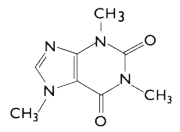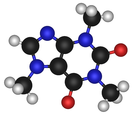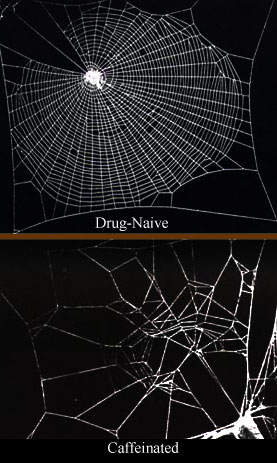Caffeine
Caffeine, sometimes called theine when found in tea, is a xanthine alkaloid found in the leaves and beans of the coffee tree, in tea, yerba mate, guarana berries, and in small quantities in cocoa, the kola nut and the Yaupon holly. In plants, caffeine acts as a natural pesticide that paralyzes and kills many insects feeding upon them. more...
Caffeine is a central nervous system (CNS) stimulant, having the effect of warding off drowsiness and restoring alertness. Caffeine-containing beverages, such as coffee and tea, enjoy great popularity, making caffeine the world's most popular psychoactive substance.
Sources of caffeine
Caffeine is a plant alkaloid, found in numerous plant varieties. The most commonly used of which are coffee, tea, and to some extent cocoa. Other, less commonly used, sources of caffeine include the plants yerba mate and guaraná, which are sometimes used in the preparation of teas and, more recently, energy drinks. Two of caffeine's alternative names, mateine and guaranine, are derived from the names of these plants.
The world's primary source of caffeine is the bean of the coffee plant, from which coffee is brewed. Caffeine content in coffee varies widely depending on the variety of coffee bean and the method of preparation used, but in general one serving of coffee ranges from about 40 mg for a single shot of espresso to about 100 mg for strong drip coffee. Generally, dark roast coffee has less caffeine than lighter roasts since the roasting process reduces caffeine content of the bean.
Tea is another common source of caffeine in many cultures. Tea generally contains somewhat less caffeine per serving than coffee, usually about half as much, depending on the strength of the brew, though certain types of tea, such as black and oolong, contain somewhat more caffeine than most other teas.
Caffeine is also a common ingredient of soft drinks such as cola, originally prepared from kola nuts. Soft drinks typically contain about 10 mg to 50 mg of caffeine per serving. By contrast, energy drinks such as Red Bull contain as much as 80 mg of caffeine per serving. The caffeine in these drinks originates either from the ingredients used or is an additive derived from the product of decaffeination or chemical synthesis.
Chocolate derived from cocoa is a weak stimulant, mostly due to its content of theobromine and theophylline, but it also contains a small amount of caffeine . However, chocolate contains too little of these compounds for a reasonable serving to create effects in humans that are on par with coffee.
Finally, caffeine may also be purchased in most areas in the form of a pill that containing from 50 mg to 200 mg. Caffeine pills are regulated differently among various nations. For example, the European Union requires that a warning be placed on the packaging of any food whose caffeine exceeds 150 mg per litre. In many other countries, however, caffeine is classified as a flavouring and is unregulated.
Caffeine equivalents
In general, each of the following contains approximately 200 mg of caffeine:
Read more at Wikipedia.org



